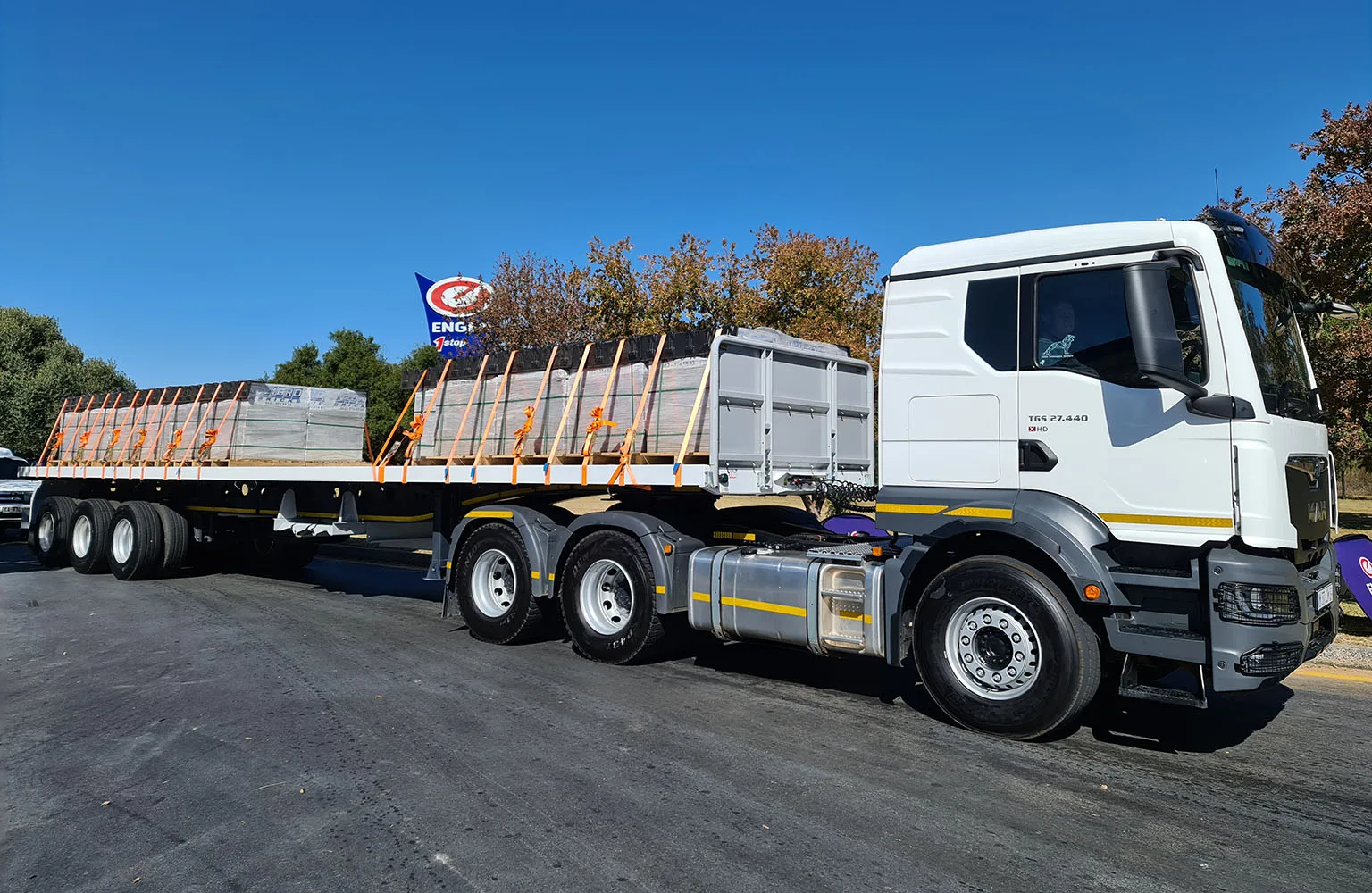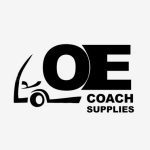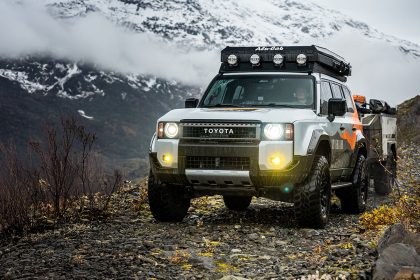THE IMPORTANCE OF SPARE PARTS
As MAN Automotive has certain products shipped into the country from Europe, such as manufacturing kits with a nine-month lead time, supply chain optimisation is a main priority for the company.
“With two different plants, we are constantly working on improving our supply chain processes and how the interaction between each plant can be made more efficient,” explains Aichinger.
“You don’t want to have a plant that is producing bodies without chassis, resulting in a standstill. On the other hand, you don’t want too many chassis standing around waiting to be bodied.”
Additionally, a continuous topic for the company is spare parts – more specifically, the optimum number of spare parts available.
As highlighted during the COVID-19 pandemic, maintaining an appropriate level of stock and dedicating the time to understanding what a suitable amount is cannot be understated.
A lack of availability can result in severe disruption to countless industries and insurmountable costs incurred by trucks and buses that remain at a standstill.
Alongside spare parts, the company and industry at large recognise that overnight shipping – or just-in-time shipping – needs to be re-evaluated.
“We are so used to getting shipped everything overnight, but it comes at a cost – i.e., to the environment – so the question becomes, where is the balance?” furthers Aichinger.
The importance of a balanced supply chain can be directly observed in the current SA environment, where the rail network has almost come to a complete standstill, forcing goods and commodities to be transported exclusively by road.
While this may seem a win for the likes of MAN Automotive in the short term, it has a devasting impact on the national economy and equal distribution of the supply chain in the long term.
Without the balance between rail and road, countries such as SA will experience a competitive disadvantage as the cost of transporting commodities resting solely on the latter is not cost-efficient.
“We need strong railways for certain goods, as it is more effective and reduces our collective carbon footprint. It would be short-sighted to say that this almost standstill is a good thing because even though we may have more trucks on the road at the moment, if the country suffers long term, so will we,” states Aichinger.
LOCALISATION IN SA
Supporting the local SA economy is a matter of great importance to MAN Automotive, and one of the primary ways in which it accomplishes this objective is through utilising local partnerships and suppliers.
During the life of a truck or bus, exchanging parts, such as batteries, is something that will inevitably be required.
In the past, the company would have these batteries shipped from Europe to SA. However, it was promptly recognised that this was not the most cost-efficient way of conducting business.
More from Africa Outlook
Therefore, MAN Automotive decided to develop a complete second line of spare parts. What started with batteries has now grown outwards as a result, consisting of a portfolio of numerous spares that serve to benefit both the business and its dedicated customer base.
When acquiring these parts, the company ensures that the quality and durability it has become known for remain consistent by imparting stringent regulations and expectations upon suppliers.
Another significant aspect of supply management includes MAN Automotive’s bodybuilding plant, where it constantly looks at how it can assist local suppliers to improve quality.
“Customers expect enhanced product quality, and we are here to help them find local companies and develop them around us,” details Aichinger.
“At the same time, we must ensure that local companies diversify and develop other supplies as well. If they become too dependent upon us and we experience some fluctuations, it could severely affect the economy.”
Quality management and the ability to attract other industries where the same products are being used is something that MAN Automotive is investing a lot of time in to support the country and its people.
Aichinger attests that it is truly a unique environment in SA compared to the other countries he has worked in, with a substantial procurement team dedicated to working hard every day to ensure quality, satisfaction, and longevity.
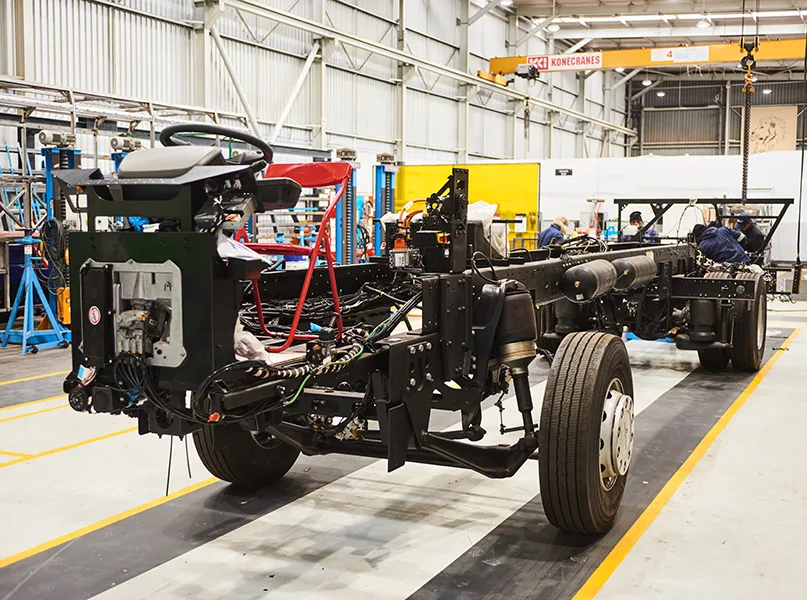
NEW TECHNOLOGIES AND INNOVATION
Currently, one of MAN Automotive’s most exciting and important projects is its introduction of e-buses into SA.
“We are proud to be bringing technology into the country – not just importing it but producing it in SA. We’ve developed a completely new body and are assembling the electromobility locally,” insights Aichinger.
The implementation of e-buses will also result in additional training and jobs for local communities, as a significant amount of education is required to safely and successfully work on these high-voltage vehicles.
Another substantial project MAN Automotive is undertaking is broad-based Black economic empowerment (B-BBEE) – an SA government policy and legislative framework that aims to increase native African participation in the economy.
The objective is to promote economic transformation, improve African representation in ownership and management structures, increase the involvement of communities and employees in economic activities, and provide skills training.
“All companies are categorised into a level depending on how much they are supporting the transformation of the country, with Level 1 being the best. We started at Level 8 and have worked our way to Level 3 through supplier development, corporate social responsibility (CSR), training, education, and diverse management,” expands Aichinger.
With CSR being an essential part of MAN Automotive’s core values, training and educating a more diverse workforce is of the utmost importance to the company.
“We don’t just do it for the sake of achieving a certificate. We do it because we sincerely believe it is helping us to ensure a more sustainable, long-lasting, and diverse future. We have seen first-hand how it is helping us with localisation, spare parts availability, shipping costs, and our carbon footprint.”
In parallel, the company is prioritising onboarding more women into the business, as the industry has been traditionally male-dominated for most of its history.
Currently, 38 percent of MAN Automotive apprentices are women, and it is seeking to increase that number even further by developing female employees’ talents and ambitions from the ground up.
Aichinger experienced the importance of a diverse workforce from a young age when his parents insisted that both he and his sisters share the same chores and responsibilities around the house.
“I’m still immensely grateful for the lessons I learned from that time, as it helped me understand that to broaden our base of talents and make our teams more successful, we need the undeniable strengths of different points of view, experiences, talents, and backgrounds. A team dominated by one majority is never as successful at the end of the day,” he imparts.
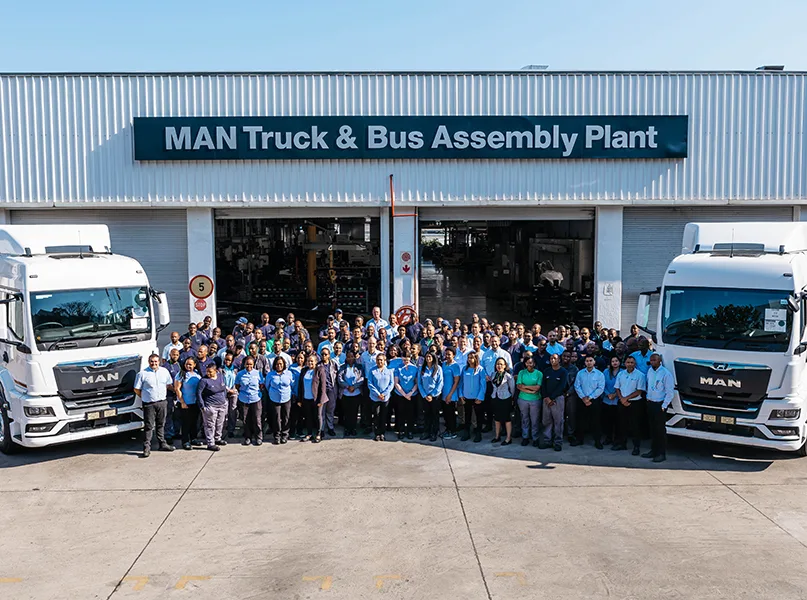
DRIVING TOWARDS A BETTER FUTURE
As a commercial vehicle manufacturer, MAN Automotive acknowledges its responsibility to do all it can to contribute to climate and environmental protection.
This, along with CSR and good corporate leadership, are increasingly crucial aspects for a viable future and an integral part of the company’s corporate strategy.
In 2022, MAN Truck & Bus anchored the topic of sustainability in its official strategy, furthering its commitment to greenhouse gas (GHG) total balance neutrality by 2050 and pledging to do so as part of the climate protection programme, Science Based Targets initiative (SBTi).
The first step consists of reducing 70 percent of GHG emissions at global sites by 2030 and lowering its truck, bus, and van fleet emissions by 28 percent.
A significant component of this GHG reduction strategy is decarbonisation through the electrification of the company’s vehicles. The initiation of this strategy can be observed through the introduction of e-buses in various models and vans with electric drives that are available to customers today.
These EVs are at their strongest in an urban environment, where they are emission-free and actively contributing to improving air quality, alongside being quieter on the roads than traditional diesel engines.
Additionally, the company is actively researching corresponding zero-emission technologies in the area of electromobility, including hydrogen combustion engines and hydrogen fuel cells, which are in the pre-development phase.
MAN Automotive is also developing and testing automated driving applications together with science and industry partners, as autonomous commercial vehicles are leading to a radical transformation of customer business models.
MAN Truck & Bus’ aim is to meet its social responsibility and become a leading provider of intelligent and environmentally-friendly transport solutions, as the company views sustainability as a key part of remaining competitive on a global scale for years to come.
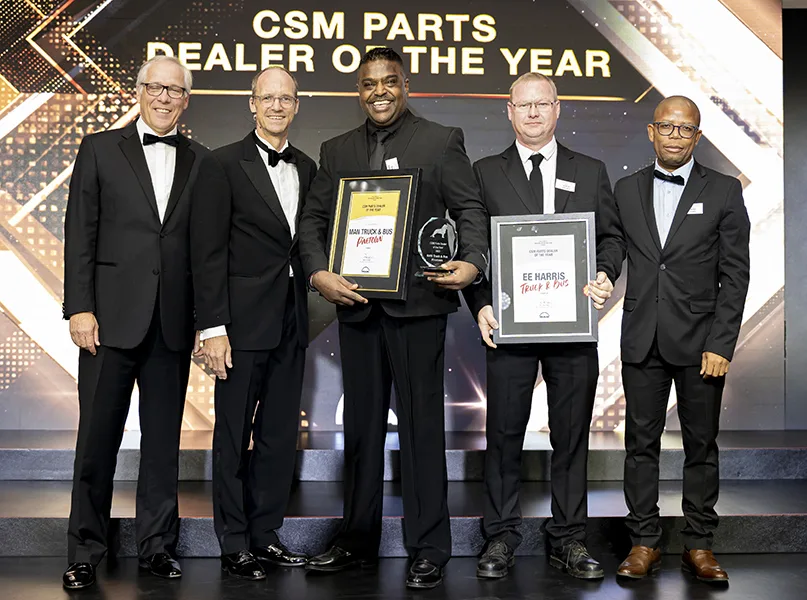
SUCCESS IS A TEAM EFFORT
Having played hockey throughout the course of his life, Aichinger is adamant that teamwork and collaboration to achieve a common goal is the framework for success in any capacity.
“Hockey is a team sport and describes how I run the company. I don’t believe that I am the best in every position, which is why I rely on my specialists and their assessments, ensuring that I can be their sounding board for any issues,” he states.
Additionally, Aichinger prioritises having an open-door policy, where people are always allowed to come in and have a conversation with him about their worries, ideas, and accomplishments.
He maintains the expectation that individuals enter not just with a problem or query, but with a proposed solution as well.
By providing space to think and ask questions without prejudice, he often finds that the best solutions are already within people, who just need an appropriate and supportive environment to discover them.
“Like an orchestra, we all need to work hand-in-hand. The horn shouldn’t be louder than the viola, and as the conductor, I need to make sure that all the instruments play in harmony,” Aichinger alludes.
Of equal importance to Aichinger is the ability to persist throughout all obstacles and remain tenacious. This stems from his experience playing sports and the understanding that the desire and drive to achieve success are some of the most inspiring motivators.
“In a hockey match, you can still win in the last 30 seconds, the last five seconds, or even the very last second. You just have to believe it’s possible and refuse to give up; those who don’t believe it is possible will never achieve it,” he insights.
Aichinger ensures this enduring mindset is encouraged throughout MAN Automotive by engaging directly with employees in their own offices and workspaces as opposed to being holed away in his own.
Not only does this allow him to learn and understand their everyday challenges, but it also motivates others to utilise Aichinger’s expertise and view management as approachable individuals.
“The team here knows the SA market better than I do, and they always will because they have lived here and have ridden the market for decades,” he details.
“Although I may not be able to get on the same level as them, I am here to provide my past expertise and knowledge to assist them even further and provide insights and different perspectives from a new angle that others may not have considered.”
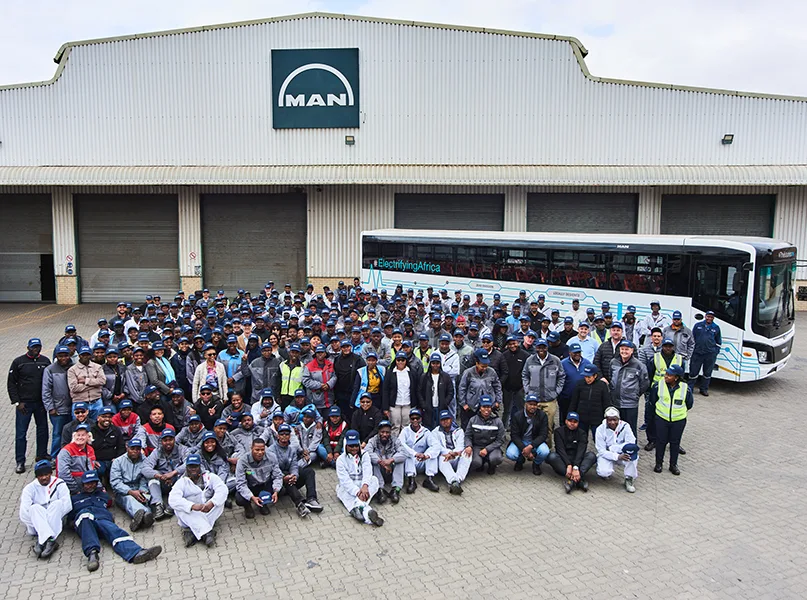
PROCURING A LONG FUTURE IN SA
Looking towards the future of MAN Automotive in the SA market, the company is highlighting a variety of key endeavours and priorities to ensure continued prosperity in the country, such as strengthening its market position.
Aichinger also possesses a secondary role within the nation as the Vice President of Medium and Heavy Commercial OEMs within the National Association of Automobile Manufacturers of South Africa (naamsa) – a non-profit organisation established in 1935 to represent manufacturing OEMs, retailing OEMs, and heavy commercial OEMS.
“In this role, and also as part of my role at MAN Automotive, I advocate for how we can make the transport business safer and protect those on the roads,” he voices.
“There’s still a lot we can do in terms of training drivers, educating people, and ensuring that vehicles are well-maintained and road-worthy.”
He acknowledges that it will take a combined effort to implement these safety solutions from both the industry as a whole and the SA government through new laws and regulations.
Internally, at MAN Automotive, the company is emphasising talent management and development. Specifically, Aichinger has recently implemented ‘Coffee with the MD’, a programme in which younger employees are invited to have a one-on-one coffee with Aichinger and spend a few hours speaking about whatever they please, as well as seeking his views on different matters.
“I’ll sit and speak with them and challenge their perspectives of the future and the country. I want to make sure they learn that they can ask any questions, as the most important thing to me is that they understand no matter who is in front of them, they are allowed to ask questions,” he emphasises.
This more casual setting encourages the young staff members at MAN Automotive to raise queries and discuss topics that they otherwise may have felt hesitant to bring up, whilst it also allows Aichinger to help develop the next generation of transportation leadership.
In parallel, the company also partakes in the SA programme, Yes for Youth – the country’s highest impact private sector youth employment programme.
The initiative aims to address SA’s youth unemployment crisis by empowering businesses to create jobs for young people by working with companies to provide 12-month quality work experiences for unemployed individuals to become the managers, skilled professionals, and entrepreneurs of the future who will drive the economy forward.
To date, the programme has created over 157,000 work opportunities for young people, further fostering socioeconomic stability and prosperity, increasing B-BBEE benefits, and building a talent pipeline for the future of SA.
“As a country, we need to be able to attract investment through highly qualified, developed, and educated people, and I think it is our responsibility as a corporation to be a part of this change for the better,” concludes Aichinger.
MAN AUTOMOTIVE SOUTH AFRICA PARTNERS





